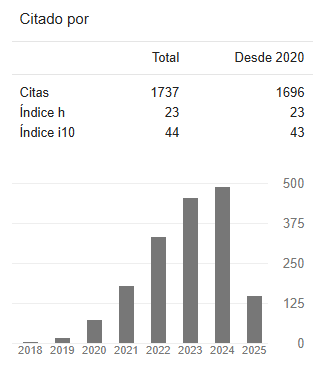Blended Learning and digital education of university teaching staff
DOI:
https://doi.org/10.29166/catedra.v1i1.762Keywords:
blended learning, digital education, online education, professor, universityAbstract
Blended learning is an integrating education program that combines computer-based activities with regular classes. It contributes to the quality of higher education through the improvement of ICT training programs and the development of e-competences in higher education. There has been a literature review of different bibliographic sources related to b-learning and Teaching Professional Development. As a result of this review, it is perceived that e-learning training programs are not efficient enough to face the challenges of blended education, and Blended Learning could be an alternative for teacher online professional development. Then, research results of the incidence of an ICT training course for higher education professors are shown. It is concluded that blended learning is an effective modality for teachers' digital education courses because the face-to-face component complements virtual learning. In addition, due to problems of connectivity and access to internet, b-learning modality is an alternative for the continuing education of higher education professors.
Downloads
References
Bartolome , A. (2004). Blended learning. Conceptos ba sicos. Píxel-Bit. Revista de Medios y Educación, 23, pp. 7-20.
Bicen, H., Ozdamli, F. y Uzunboylu, H. (2014), Online and Blended Learning Approach on Instructional Multimedia Development Courses in Teacher Education. Interactive Learning Environments, 22 (4), pp. 529-548.
Bonk, C. J., y Graham, C. R. (2004). Handbook of blended learning: Global Perspectives, local designs. San Francisco, CA: Pfeiffer-An Imprint of Wiley.
Cobo, C. y Moravec, J. (2011). Aprendizaje Invisible. Hacia una nueva ecología de la educación. Barcelona: Publicacions i Edicions de la Universitat de Barcelona.
Donnelly, R. (2010). Harmonizing Technology with Interaction in Blended Problem-Based Learning. Computers & Education, 54 (2), pp. 350–59. https://doi.org/10.1016/j.compedu.2009.08.012
Drysdale, J. Graham, C., Spring K. y Halverson, L. (2013). An analysis of research trends in dissertations and theses studying blended learning. Internet and Higher Education, 17, pp. 90–100.
Fainholc, B. (2008). Modelo tecnolo gico en lí nea de Aprendizaje electro nico mixto (o Blended learning) para el desarrollo profesional docente de estudiantes en formacio n, con e nfasis en el trabajo colaborativo virtual. RED. Revista de Educación a Distancia, 21, pp. 1-34.
Gregory, J. y Salmon, G. (2013). Professional development for online university teaching. Distance education, 34 (3). https://doi.org/10.1080/01587919.2013.835771
Gu zer, B. y Caner H. (2014). The past, present and future of blended learning: an in depth analysis of literature. Procedia - Social and Behavioral Sciences, 116, pp. 4596 – 4603.
Halverson, L.R., Graham, C.R., Spring, K.J. y Drysdale, J.S. (2013). An analysis of high impact scholarship and publication trends in blended learning. Distance Education, 33 (3), pp. 381-413.
Halverson, L. R., Graham, C. R., Spring, K. J., Drysdale, J. S., y Henrie, C. R. (2014). A thematic analysis of the most highly cited scholarship in the first decade of blended learning research. The Internet and Higher Education, 20(0), pp. 20–34. https://doi.org/10.1016/j.iheduc.2013.09.004
Heinze, A., y Procter, A. (2004). Reflections on the Use of Blended Learning. Education in a Changing Environment conference proceedings. University of Salford: Salford. Lo pez Noguero, F. (2005). Metodología participativa en la enseñanza universitaria. Madrid: Narcea.
Llorente, M. C., y Cabero, J. (2008). Del e-learning al Blended Learning: nuevas acciones educativas. Quaderns digitals, 51, pp. 1-9.
Matzat, U. (2013). Do Blended Virtual Learning Communities Enhance Teachers’ Professional Development More than Purely Virtual Ones? A Large Scale Empirical Comparison. Computers & Education, 60 (1), pp. 40–51. https://doi.org/10.1016/j.compedu.2012.08.006
Moravec, J. (de.) (2013). Knowmad society. Minneapolis: Education Futures.
Owston, R., Wideman, H., Murphy, J. y Lupshenyuk, D. (2008). Blended Teacher Professional Development: A Synthesis of Three Program Evaluations. Internet and Higher Education, 11, pp. 201–210. https://doi.org/10.1016/j.iheduc.2008.07.003
Pen alosa, E. (2013). Estrategias docentes con tecnologías: guía práctica. Me xico: Pearson. Pe rez Go mez, A. I. (2010). Aprender a educar. Nuevos desafí os para la formacion de docentes. Revista Interuniversitaria de Formación del Profesorado, 68, pp. 37-60.
Rienties, B., Brouwer, N. y Lygo-Baker, S. (2013). The effects of online professionaal development on higher education teachers´beliefs and intentions towards learning facilitation and technology. Teaching and Teacher Education, 29, pp. 122-131.
Regalado, J. A. (2013). Las competencias digitales en la formacio n docente. Ra Ximhai, 9 (4), pp. 21-29. Disponible en: http://www.redalyc.org/articulo.oa?id=46129004002
Seldin, P. (2011). El portafolio docente. Quito: Codeu Schnerkenberg, D. (2010). Overcoming Barriers for eLearning in Universities--Portfolio Models for eCompetence Development of Faculty. British Journal of Educational Technology, 41 (6), pp. 979-991.
Valverde-Berrocoso, J. (coord.) (2011). Docentes e-competentes. Barcelona: Octaedro. Valverde-Berrocoso, J.; Garrido, M.C.; Ferna ndez, R. (2010). Ensen ar y aprender con tecnologí as: un modelo teo rico para las buenas pra cticas con tic. Teoría de la Educación. Educación y Cultura en la Sociedad de la Información, 11 (1), pp. 203-229.
Valverde-Berrocoso, J., Lo pez E., Garrido M. C. y Dí az D. (2004). Educacio n superior y entornos virtuales de aprendizaje: evolucio n de la oferta formativa on-line en las Universidades Pu blicas. Revista Qurriculum, 17, pp. 95-117.
Valverde-Berrocoso, Jesu s & Balladares Burgos, Jorge (2017). Enfoque sociolo gico del uso del b-learning en la educacio n digital del docente universitario. Sophia: colección de Filosofía de la Educación, 23(2), pp. 123-140.
Volk, B. y Keller, A. (2010). Zurich E-Learning Certificate. A role model for the acquirement of eCompetence for Academic Staff. European Journal of Open, Distance and ELearning,1, pp. 1-8.
Wold, K. (2013). Collaborative Inquiry: Expert Analysis of Blended Learning in Higher Education. International Journal on E-Learning 12 (2), pp. 221–38.
Downloads
Published
Versions
- 2020-09-03 (3)
- 2020-09-03 (2)
- 2018-09-26 (1)









